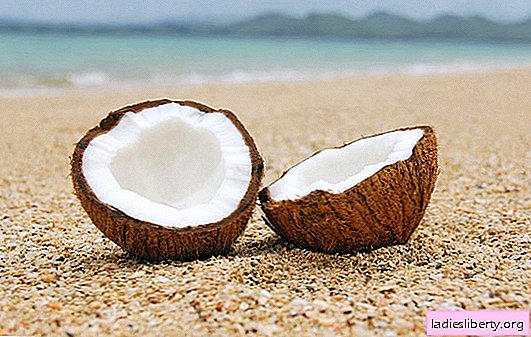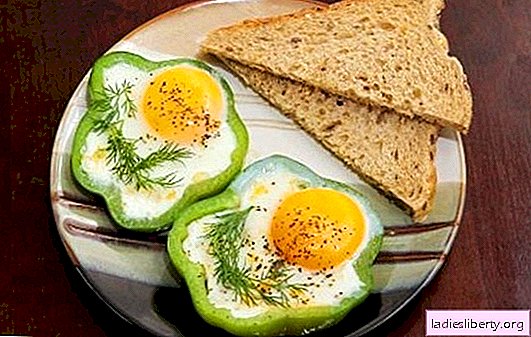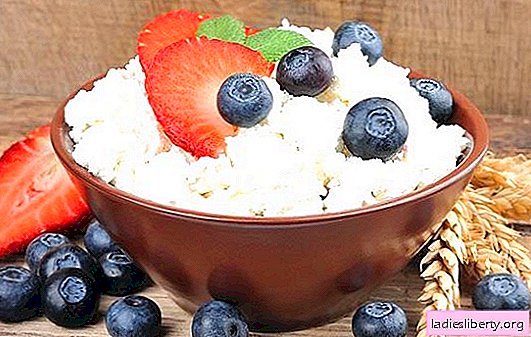
The beneficial properties of coconut are known for a long time.
Coconut has arrived in our country from Indonesia, Brazil, Sri Lanka and other warm countries.
It is a mistake to consider a coconut a nut, because it does not contain a kernel, like other nuts.
Coconut is a drupe consisting of pulp and liquid.
The name coconut translated from Portuguese means "a monkey". The Portuguese called this fruit so, because the three spots on the surface of the coconut resemble the face of a monkey.
But why coconut remains without special attention on the shelves of the Russian shelves? How much benefit will coconut use for the human body?
To get answers to these questions, it is worth exploring the composition of this fruit.
The composition and calorie coconut
Coconut is a fruit consisting of two layers and a liquid.
The outer layer - the shell or exocarp - is very durable and difficult to mechanical impact. The inner layer - endocarp or copra - is the edible part of the coconut, the pulp. It is on the inside that those three spots are located, because of which the coconut got its name. Coconut liquid or endosperm matures with coconut, coconut milk is produced from coconut water.
In the mature fruit, coconut milk thickens and hardens.
The composition of coconut pulp (per 100 g):
• Proteins - 3.33 gr
• Fat - 33.49 gr
• Carbohydrates - 6.23 gr
• Dietary fiber - 9 gr
• Water - 46.99 gr
• Ash - 0.97 gr
• Mono- and disaccharides - 6.23 g
• Saturated fatty acids - 29,698 gr
Fat in the pulp is quite a lot, so the calorie content of coconut is high - 353 kcal per 100 g. And in dry coconut calories are even more - 592 kcal per 100 grams. As for coconut water, it contains 16.7kkal per 100g.
There are a lot of vitamins in coconut (per 100 g of edible part):
• Vitamin B1 - 0.066 mg
• Vitamin B2 - 0.02 mg
• Vitamin B3 - 0.3 mg
• Vitamin B6 - 0.054 mg
• Vitamin B9 - 26 micrograms
• Vitamin C - 3.3 mg
• Vitamin E - 0.24 mg
• Vitamin K - 0.2 mcg
• Vitamin PP - 0.54 mg
• Choline - 12.1 mg
In addition to vitamins, the coconut pulp includes micro and microelements that have a positive effect on human health:
• Calcium
• Magnesium
• Sodium
• Potassium
• Phosphorus
• Iron
• Zinc
• Copper
• Manganese
• Selenium
• iodine
But this is not a complete list of useful components of this tropical fruit. The coconut contains amino acids, antioxidants, fiber, and natural oils.
American scientists claim that the composition of coconut water is close to the composition of human blood. This water contains minerals in the amount that is necessary to man. Therefore, after physical exertion or sports training, it is more beneficial to drink coconut water than sports drinks. But you need to drink coconut water immediately after opening the coconut.
The beneficial properties of coconut are explainable by its composition, but not all people know what benefits this organism will bring to the body. And the range of use of coconut is quite wide, so the positive impact of this fruit is felt from the inside and outside.
How to use coconut with benefits?
Coconut pulp famous for its pleasant taste. Consume this pulp both raw and dry.
Coconut chips are made from dry coconut, which is used in baking, in the preparation of desserts, puddings, smoothies, etc. Add coconut pulp and salads, and snacks, and porridge. This tropical fruit gives dishes a sweetish aroma and specific flavor.
Coconut milk also used in cooking. It is added to soups, meat and fish dishes. Still made from this milk sauces and drinks.
From the dried coconut pulp get Coconut oilwhich is used not only in cooking. Coconut oil is also popular in cosmetology, and in the pharmaceutical and perfume industries.
Coconut oil is good for hair and scalp. Regular use of this oil will help prevent split ends and hair splitting. Coconut oil nourishes, moisturizes and protects hair. It is recommended to use this tool for those who suffer from excessive hair dryness. But it is worth remembering that coconut oil washes away unnatural pigment from the hair, so it is better not to apply this product to freshly dyed hair.
Coconut oil is good for the skin. It helps to preserve skin youth and improve metabolic processes. Popular use of this oil for massage purposes. The aroma of coconut has a calming effect, so it helps to relax during a massage.
In addition, coconut is used even in the production of building and household materials. More precisely, not the whole coconut, but only its hard part. The coconut shell fibers are called coconut coir.
From these fibers make ropes, ropes, brushes, carpets, etc. Coconut coir is used to make a hard layer of mattresses, as it has high strength.
Coconut shell is included in the composition of drug-absorbents, which have a positive effect on the bowels and help to remove toxins and slags from the body.
Coconut shell used for the manufacture of dishes, toys and souvenirs that tourists bring with them from warm countries. Even musical instruments are made from this shell.
What is the use of coconut for the human body?
The edible part of coconut - pulp and milk - contains vitamins and minerals that are necessary for the normal functioning of human internal organs.
Coconut the pulp is rich in protein, therefore, the use of this tasty part of coconut is recommended for those who want to gain weight. Indisputable use of coconut for athletes and bodybuilders, in particular. Coconut helps build muscle mass in a short time and nourishes the body with energy, as this exotic fruit contains a large number of calories.
Coco - strong afrodziakwhich increases sexual desire. This fruit has a positive effect on the reproductive functions of a person. In addition, coconut helps to treat urological diseases.
This tropical fruit contains cellulosetherefore, coconut is useful for constipation and other problems with the gastrointestinal tract. Coconut helps get rid of bloating, gas and stomach pain.
This fruit can be used even for people suffering from a stomach ulcer. Coconut milk will help not only alleviate the symptoms of this disease, but also help to cure an ulcer. Coconut milk is also effective in diseases of the kidneys and gall bladder.
Coconut has a positive effect on the thyroid gland. This exotic fruit contains a considerable amount of iodine, so coconut helps to cope with such a disease as colloid goiter and other thyroid pathologies.
The composition of coconut is lauric acid, which is the main acid from breast milk. Together with vitamins and minerals, lauric acid will help strengthen the human immune system, increase resistance to many diseases and improve well-being. The substances that make up the coconut help speed up the metabolism.
Scientists say that coconut helps to overcome the appearance of cancer. This is especially true for breast cancer, so this tropical fruit should be included in the diet of women.
In addition to the above, coconut helps with diseases of the eye and deterioration of vision, with diseases of the heart and blood vessels and with diseases of the joints.
For colds, sore throat and flu, it is recommended to use coconut milk, as it will soften the sore throat. Coconut has anti-inflammatory effects. In addition, after drinking a little coconut milk, you can fill your body with energy and provide the necessary nutrients.
Among scientists and nutritionists, there have long been debates about the benefits and harms of coconut. Useful properties of this fruit are indisputable, but will not the use of coconut bring harm to the human body?
Coconut: what is the harm to health?
It is widely believed that coconut is harmful to the health of the heart and blood vessels due to its high caloric content and fat content. However, studies have shown that fats that are part of this tropical fetus do not cause cardiovascular diseases, because not all fats affect cholesterol levels equally. But still lean on coconuts for people who have problems with excess weight, it is not recommended.
The use of this fruit is not recommended for those who have a tendency to diarrhea. There are no more contraindications for coconut. There are rare cases of individual intolerance or allergic reactions, so if a person has never consumed this fruit, you should not eat it for the first time too much.
Useful or harmful coconut for children?
All children love sweets with coconut flakes, but is coconut consumption harmful? The children's stomach is more susceptible to food than in adults, therefore, it is not worth earlier than a year or two to introduce this tropical fruit into the child’s diet. Do not give early coconut allergic children, so as not to provoke an allergic reaction. Ideally, all tropical fruits are introduced into the child’s diet from the age of three.
Coconut contains many vitamins and minerals necessary for the full development and good growth of the child's body. Calcium has a positive effect on the bone system and teeth, and iron helps prevent anemia.
This tropical fruit charitable effect on children's skin. Coconut oil is an excellent natural skin care product for babies. In addition, coconut oil helps protect the skin of the child from exposure to sunlight.
There are no contraindications for coconut consumption by children. Do not eat this fruit only in case of individual intolerance or allergies. Coconut will help ensure the normal growth and development of the child, saturate the body with vitamins and minerals and energize.











